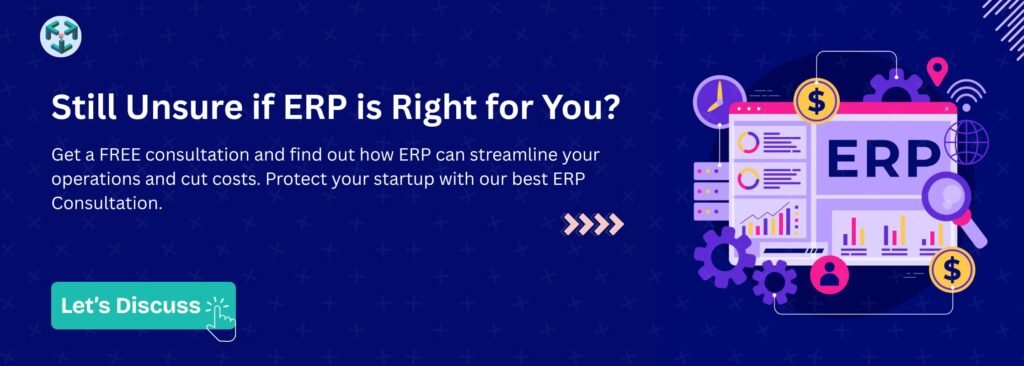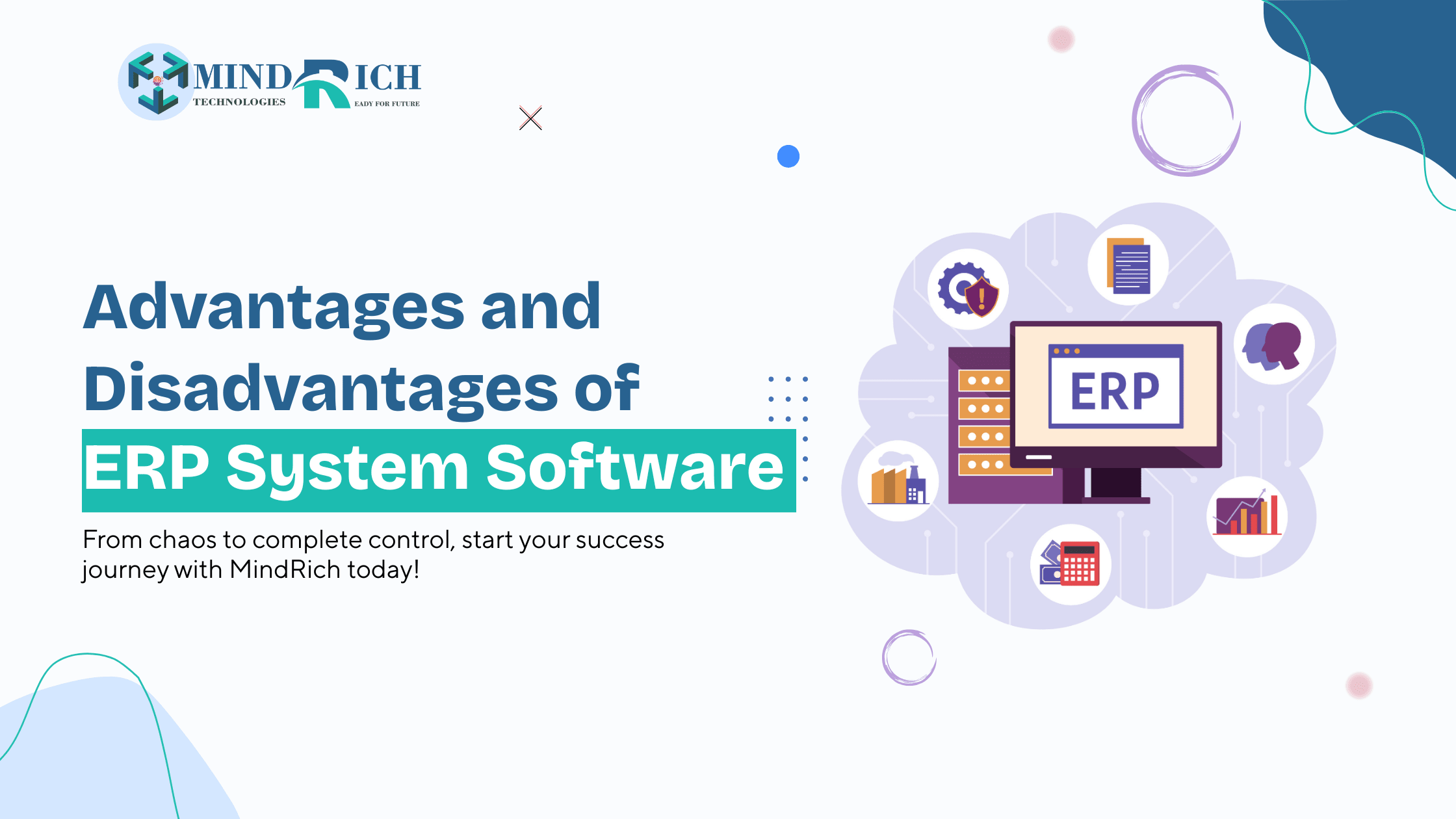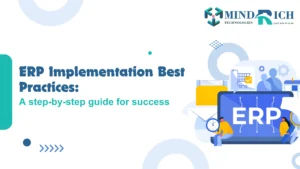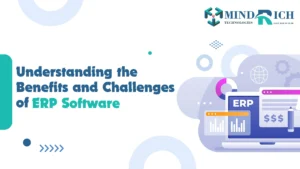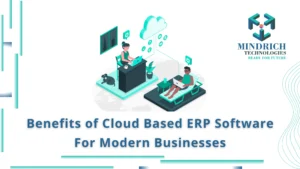Are you a business owner? Or you’ve just launched your startup, or maybe you’re already running an established company/business, but struggling to manage your business operations in one place. Let’s breakdown about ERP System software to make it easy for you.
Now imagine this: your sales team is using some different tools for managing leads, your inventory, warehouse storage, and finances are getting tracked in separate spreadsheets, and your other operations are distributed across various platforms. At first, it might look fine, but as your business grows, things will start to get messy, resulting in more delays, more confusion, and more wasted time.
That’s where an ERP Software comes to the rescue. It will help you to bring everything together so that you can manage your entire business operation smoothly and efficiently. Using an ERP Software will save your time, capital, and keep your business ahead in today’s fast-moving market.
What is ERP Software?
In today’s fast-paced world, many businesses, whether they’re large companies, manufacturing units, healthcare centers, or service firms, are struggling to manage their operations, finances, and data efficiently. To help with these challenges, ERP systems (Enterprise Resource Planning systems) were introduced. ERP software offers several scalable solutions that help businesses run more smoothly and effectively.
An ERP system plays a vital role in organizing business operations without any usual chaos. Using ERP means growing your business faster and enhancing productivity. It offers various modules such as accounting, operations, manufacturing, sales, inventory, supply chain, CRM, HR, and finance – all of which improve efficiency through automation and smart data analysis.
By using ERP software, companies can better understand the current modern market demands and trends, opening the way for long-term success. The main goal of an ERP system is to provide smooth, streamlined, and scalable operations so that companies and organizations can make better decisions, boost their workflow speed, and enhance overall performance.
The real beauty of an ERP system lies in its ability to seamlessly and smoothly integrate various business modules. It actually saves time, reduces errors, and helps increase productivity. In this blog, we’ll explore some merits and demerits of an ERP system, will see different types available, and guide you on how you can choose the right ERP solution based on your business needs, so that you can make an informed decision aligned with your business’s unique needs and goals.
Also Read: What is ERP: A Comprehensive Guide?
Benefits of using an ERP Software
If you want to grow your business, increase its productivity, and build long-term relationships by offering satisfying services to your customers, then an ERP system can play a major and vital role. ERP Software will benefit your business.
An ERP system brings together your scattered operations, finance work, and data management into just one platform. This helps business leaders to better understand their company’s resources and unique requirements, so that they can make smarter decisions, offer better services, and stay ahead in the current modern market.
Now let’s look at some key business benefits of an ERP software:
1. Enhanced Business Efficiency
An ERP system automates your daily business tasks like billing, finance, data entry, and order tracking. You can easily manage all your operations from a single software. This will save your time, improve workflow, reduce manual work, and help your team work faster and more efficiently without any errors.
2. Better Decision Making
When all your data, like sales, expenses, inventory, and accounts, is in one place, then it becomes easier to understand what’s working and what’s not. ERP gives you a clear and accurate view of your business so that you can make smart, quick, and effective decisions.
3. Real-Time Accurate Reporting & Analytics
ERP provides real-time, accurate reports and dashboards. Instead of relying on outdated Excel sheets or Tally files, you can get instant updates on your finances, inventory, stock levels, or sales performance all in just one place.
4. Cost-Effective & Budget Friendly
ERP might seem costly at first, but in the long run it helps reduce overall business costs like labor costs and operational delays. It improves efficiency, cuts down errors, avoids double work, and saves your business from losses caused due to mismanagement.
5. More Income, Less Time Investment
When your processes are faster and automatic, your team will be able to focus on tasks that actually bring revenue. That means better business growth and higher income in just less time.
6. Better Customer Service
ERP allows you to manage customer orders, queries, delivery tracking, and feedback all in one place. This helps resolve issues quickly, ensures on-time delivery, and keeps your customers happy and satisfied.
7. Seamless Third-Party Tool Integration
If you use some third-party tools like payment gateways, CRM software, or shipping services, ERP will connect them smoothly with your main system. This keeps everything running together without much extra effort.
8. High-Level Data Security
ERP systems come with built-in data security features. By using this you can easily control who accesses what data, also the system regularly backs up the data automatically by keeping your business information safe and protected.
Also Read: Benefits Of Cloud Based ERP Software For Businesses
Advantages of Using an ERP System
After looking at the key benefits of ERP software, now let’s talk about some major and strong merits of using an ERP system — points that truly make a difference in how a business can run smoothly on a daily basis.
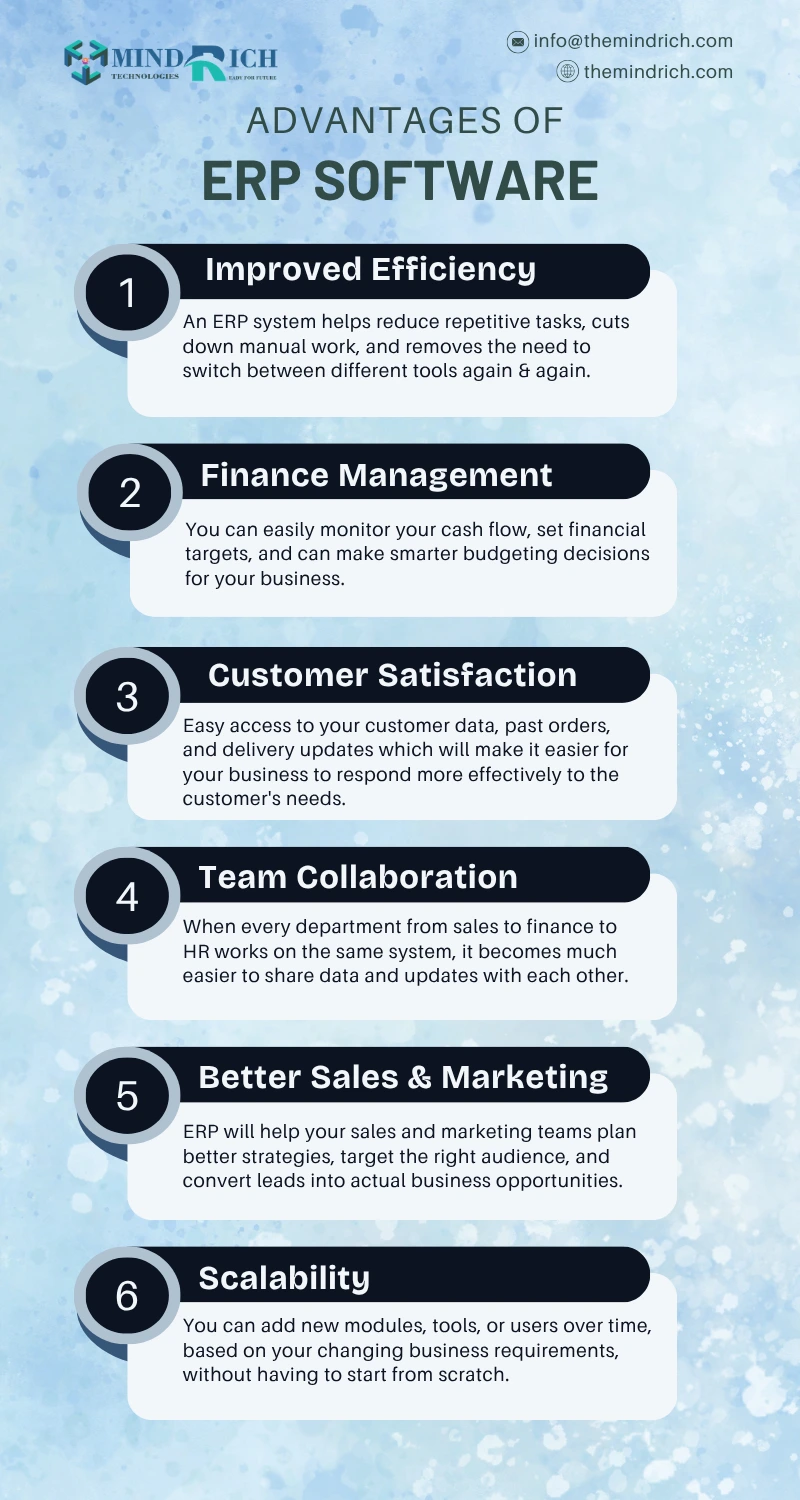
1. Improved Efficiency and Productivity
An ERP system helps reduce repetitive tasks, cuts down manual work, and removes the need to switch between different tools again and again. When all your work is managed only on one single platform, your team can work faster, stay focused on just important tasks, and avoid mismanagement which overall boosts your business performance.
2. Better Financial Planning and Management
ERP systems make it easier to track your expenses, budgets, transactions, income, and revenue all with real-time accuracy. You can easily monitor your cash flow, set financial targets, and can make smarter budgeting decisions for your business. It also helps you to avoid financial errors and brings more transparency
3. Improved Customer Service and Satisfaction
You can have access to your customer data, past orders, and delivery updates all in just one place, it will become easier for your business to respond more effectively to the customer needs. This will improve the quality of your services and help you to build strong and long-term relationships with your customers.
4. Team Collaboration
When every department from sales to finance to HR works on the same system, it becomes much easier to share data and updates with each other. This will reduce the communication gaps and encourage smooth and faster teamwork within your organization.
5. Better Sales and Marketing
An ERP system gives you detailed insights into customer behavior, buying patterns, and sales & market trends. This will help your sales and marketing teams plan better strategies, target the right audience, and convert leads into actual business opportunities more effectively.
6. Scalability
As your business grows, your ERP system will grow with it too. You can add new modules, tools, or users over time based on your changing business requirements without even starting everything from scratch.
Disadvantages of using an ERP Software System
Now just like every coin has two sides, ERP systems also come with few challenges. While they offer strong benefits, it’s equally important to understand their drawbacks too, especially if you’re just starting your business or trying to scale it.
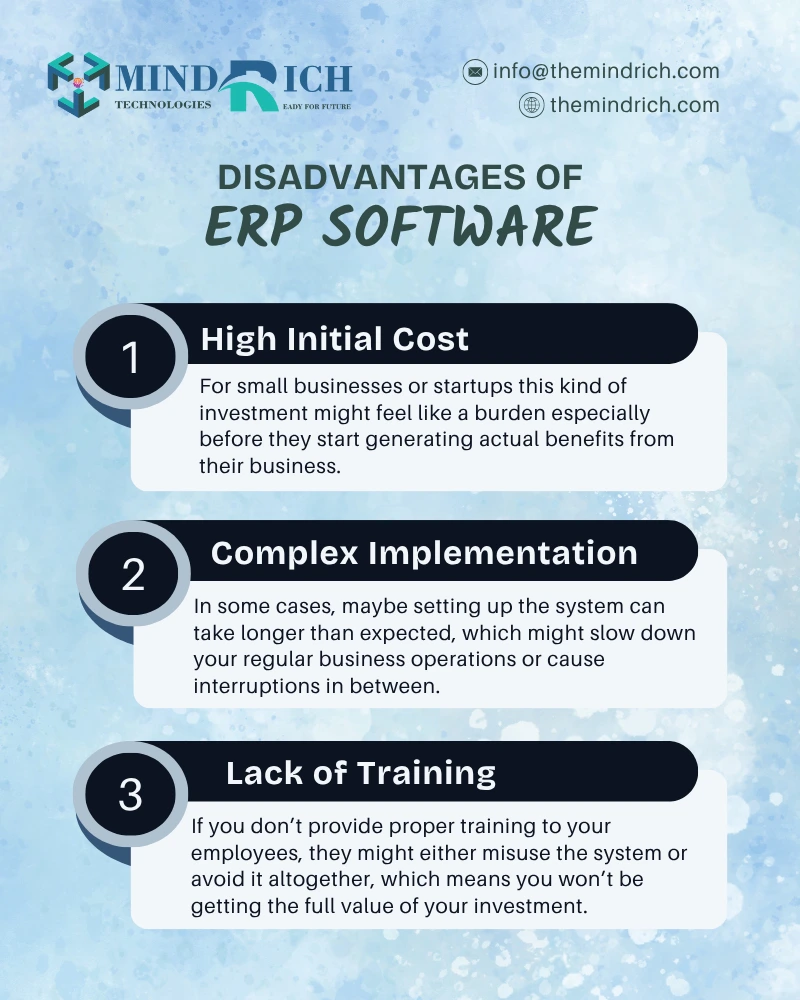
- High Initial Cost – In the starting, an ERP system might feel heavy on your pocket or your budget. You may need to spend on system setup, software licensing, support, training, and even on consulting services. And if you want to customize the software as per your needs, that adds more cost as well. For small businesses or startups this kind of investment might feel like a burden especially before they start generating actual benefits from their business.
- Complex Implementation Process – Installing and running an ERP system isn’t as simple as setting up a normal app. It requires proper planning, time, and sometimes even temporary changes for your current way of working. In some cases, maybe setting up the system can take longer than expected, which might slow down your regular business operations or cause interruptions in between.
- Employee Resistance or Lack of Training – See now not every team member may be ready to accept a new system, especially if they’re used to working the old way. For older or non-tech employees, it can feel overwhelming. And if you don’t provide proper training to your employees, they might either misuse the system or avoid it altogether which means you won’t be getting the full value of your investment.
Explore the Types of ERP systems
Now that we’ve understood what an ERP system is and looked at its merits and demerits, let’s talk about the different types of ERP systems available in today’s market. Each ERP system is designed based on business size, requirements, budget and needs. So, the right ERP system for your business completely depends on what your business actually requires.
1. On-Premise ERP
This is the traditional type of ERP system. It gets directly installed into your company’s computers, laptops and servers. You and your team will have full control over it but along with that control comes up with the responsibility of managing everything like updates, security and IT support. This type of ERP usually requires a high amount of investment in hardware, installation and maintenance. It’s a good choice if you have a large business, your own strong IT team, or you just want full control of your data.
2. Cloud-Based ERP
This is the online and modern version of ERP. You don’t have to install anything, just need to log in using the internet. This ERP provider takes care of everything like system updates, backups and data security. As your business grows, you can scale it up easily and it’s also accessible from anywhere. It’s ideal one for small businesses, startups or companies with remote teams. It needs less IT support, offers regular updates and gives better security. If you want something cost-effective and easy to manage, this ERP can be a great fit for your business.
3. Hybrid ERP
As the name suggests, this is a mix of both, one part of ERP runs on your own system (on-premise) and one part of ERP works online (cloud). It gives you both flexibility and control. This type of ERP is useful for businesses that are shifting from old systems to new ones. Use this one if you want to take the benefits of both setups or if you don’t want to move everything online at once.
4. Industry-Specific ERP
These ERP systems are specially made for particular industries like healthcare, retail, education, manufacturing, real estate, travel, and more. The tools and features in this ERP are developed exactly according to the needs of that specific industry. It’s a good option if your business involves special processes that a general ERP can’t handle easily. Choose this one if you’re in a specific field and need a solution that’s already designed just for that industry.
Choosing the Right ERP System for Your Business Needs
A right ERP system can be truly a game-changer mode for your business. But before choosing one, it’s very important to understand what key factors you need to look at while selecting an ERP system for your business. Here are some of the important and major points that can make your decision-making process easier and better.
1. Understand Your Business Needs
The first and most important thing is to understand what your actual business needs and requirements are. What kind of problems do you face while handling your business? Do you have too much manual work? Do you face issues while managing reporting, inventory, or HR tasks? Until and unless you’re clear about your core problems and daily challenges, it’ll be difficult for you to choose the right and suitable ERP system for your business.
2. Business Size and Industry
Your ERP system should always be selected based on your business size and the type of industry you’re in only. If you have a small business or startup, you’ll need a lightweight and simple ERP system that’s easy to handle and also fits within your budget. But if you’re running a large-scale business like manufacturing or healthcare, then you’ll need a powerful, more efficient, and industry-specific ERP that can smoothly handle complex requirements.
3. Budget
Getting an ERP system is more like making an investment for your business, so you’ll need to check how much your budget allows. It’s not just about the software cost, but also includes installation and implementation charges, training sessions, support, and maintenance costs. So, you should always think from a long-term perspective before making the final decision to select any type of ERP system.
4. Scalability
It’s very important to ensure that your ERP system can work and adjust according to your business growth in the future. Maybe today you have a small team, but tomorrow you might need to add more users, new modules, or some extra tools. So, checking if your ERP system can handle that kind of growth or not, and that’s what we call scalability, which is necessary for your business for future growth.
5. Customization Option
Every business is different, and it’s possible that a ready-made ERP may not fully match your specific needs or work smoothly for your setup. That’s why it’s important to check how customizable the ERP system is. Can you add or change modules? Can you design reports or dashboards in your own way? You should also see how flexible the system is when it comes to making such changes.
6. Vendor Support and Training
Having strong vendor support is very important. You should always get proper help and guidance in case you face any technical issues or confusion while using the system. Also, your team should get proper training so they can use the ERP system efficiently. If vendor support is weak, you might not be able to take full advantage of your ERP system.
7. Integration with Third-Party Tools
If your business uses other tools like a payment gateway, CRM, shipping software, etc., then your ERP system should be able to integrate with those tools smoothly. This helps keep your data synced. Also, you won’t have to switch between platforms or log in again and again to get the work done.
8. Easy to Use and User-Friendly Interface
An ERP system is only useful when your team can actually use it with ease. If the system is too complex, your employees will get confused and make even more mistakes. So, try to go for a system that’s simple, clear, and has a user-friendly interface so that your employees at all levels can easily understand and operate it.
Final Thoughts
In today’s fast-moving and competitive business world, keeping your business organized, efficient, and running smartly has become more important than ever. And that’s exactly where an ERP system comes to help. By bringing all your business processes and modules together in just one place. Whether it’s finance and accounting, inventory management, HR tasks, or tracking your customer services.
As we’ve already seen, an ERP system offers several strong benefits that simplify many business modules. Saving time, helping with better decision-making, and giving real-time access to data are common benefits. But along with running an ERP system, there are also some challenges as well like the initial investment cost or employee training, and more. That’s why it’s very important to choose the right ERP system according to your business size, needs, and goals.
Whether you’re running a new startup or have an established company, a suitable ERP system can always make your work easier than ever. It will reduce errors, and help you grow your business in a much smarter way. ERP isn’t just a software, it can become your long-term business partner that stays with you throughout your business success journey.
